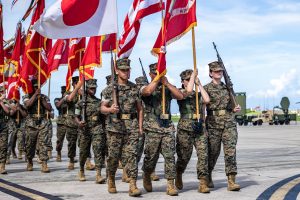The recent decision to reconstitute U.S. Forces Japan (USFJ) under the structure of a Joint Forces Headquarters (JFHQ) marks a profound shift in the strategic and operational posture of the United States’ military presence in the Asia-Pacific region. This transformation, which goes beyond mere bureaucratic reorganization, has significant implications for regional security dynamics, especially for South Korea.
The primary objective behind establishing the JFHQ is to enhance the coordination and integration of various military branches operating within the region. By creating a unified command structure, the United States aims to streamline operations, improve joint capabilities, and respond more effectively to emerging threats. This move reflects a broader trend toward optimizing command structures to address complex, multi-domain threats that characterize modern warfare. The JFHQ will be tasked with consolidating command responsibilities under a three-star general, a strategic shift designed to elevate operational efficiency and effectiveness.
This reconstitution signals a renewed commitment to strengthening deterrence in the Asia-Pacific region, particularly against the backdrop of escalating threats from China and North Korea. The creation of a unified command structure is anticipated to enhance the U.S. military’s ability to project power, maintain a credible deterrent posture, and rapidly respond to any regional crises. This strategic realignment also furthers the U.S. policy of rebalancing its military focus toward the Indo-Pacific, while underscoring Japan’s role as a critical ally and strategic hub in the region.
For South Korea, the reorganization of USFJ into a JFHQ carries several profound implications. The shift in regional security dynamics is likely to impact the balance of power across the Asia-Pacific.
Given South Korea’s heavy reliance on the U.S. military presence for its own security, the reconstitution of USFJ may necessitate a reassessment of South Korea’s strategic posture and defense planning. The potential redirection of U.S. focus toward Japan could inadvertently shift some attention away from the Korean Peninsula. This change may prompt South Korea to seek a more prominent role in regional security arrangements or advocate for adjustments in the bilateral defense cooperation framework to ensure alignment with U.S. strategic objectives.
The reorganization of USFJ could also foster closer operational collaboration between USFJ and U.S. Forces Korea (USFK). With the U.S. aiming for greater integration within its regional forces, there may be increased coordination between USFJ and USFK. This enhanced collaboration could lead to more joint exercises and shared strategies, contributing to improved overall regional security. However, this integration could also introduce complexities in managing overlapping responsibilities and ensuring smooth operational coordination between the two commands.
Additionally, the enhanced capabilities and expanded focus of the JFHQ might place added pressure on South Korea to bolster its own defense capabilities. Seoul may need to invest significantly in its military modernization efforts to complement the U.S. presence and ensure it can independently address regional threats.
The reconstitution could also impact South Korea’s diplomatic relations with both the U.S. and Japan. Seoul may face the challenge of navigating a complex diplomatic landscape, balancing its alliances with the U.S. and Japan while managing its own national security interests. This situation could require heightened diplomatic engagement and negotiation to ensure that South Korea’s strategic concerns are adequately addressed and not overshadowed by the new U.S. military posture.
The reconstitution of U.S. Forces Japan into a Joint Forces Headquarters represents a strategic shift aimed at enhancing operational efficiency, joint capability, and regional deterrence. For South Korea, this change brings a mix of opportunities and challenges. While the increased integration and capabilities of the JFHQ could strengthen regional security and improve collaboration with U.S. Forces Korea, South Korea must carefully navigate the implications for its own defense strategy and diplomatic relations. As the regional security environment continues to evolve, South Korea’s strategic adjustments and proactive engagement with both the U.S. and its regional partners will be crucial in maintaining stability and safeguarding its national interests.
































